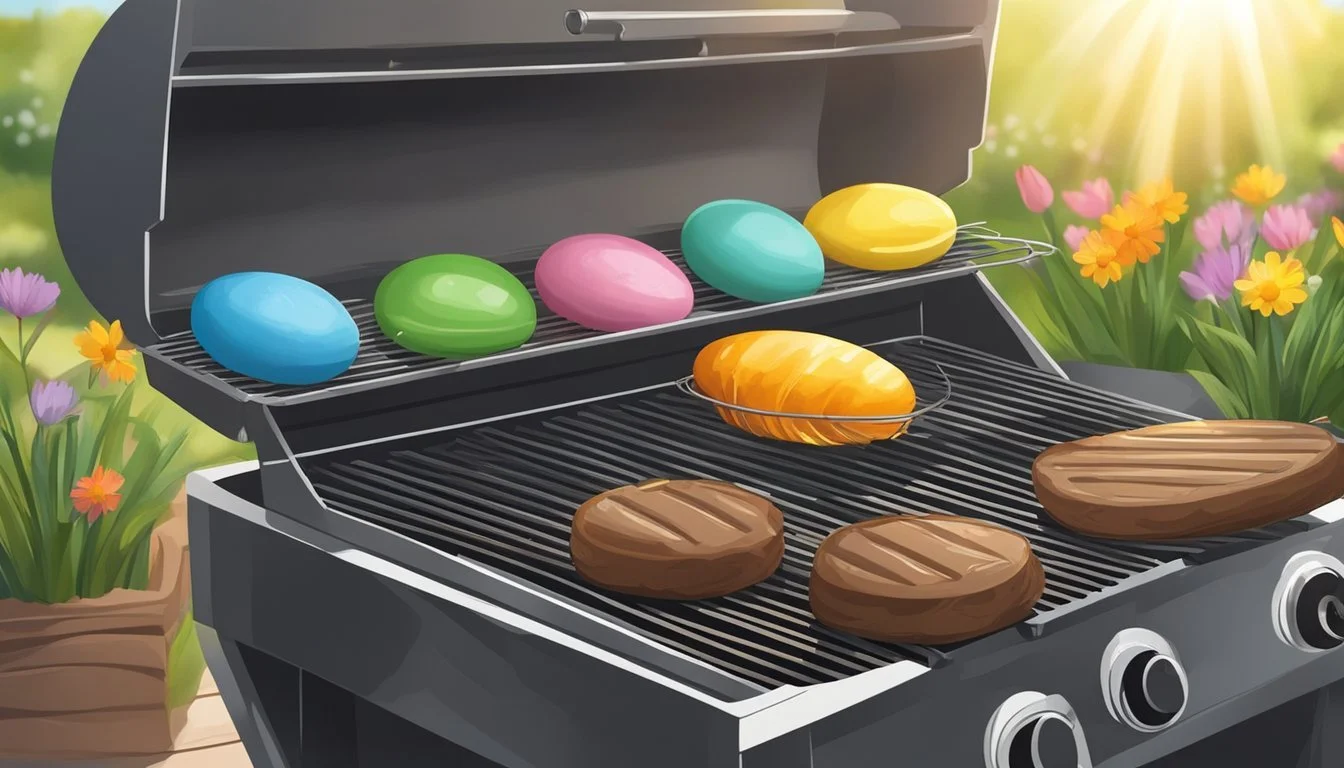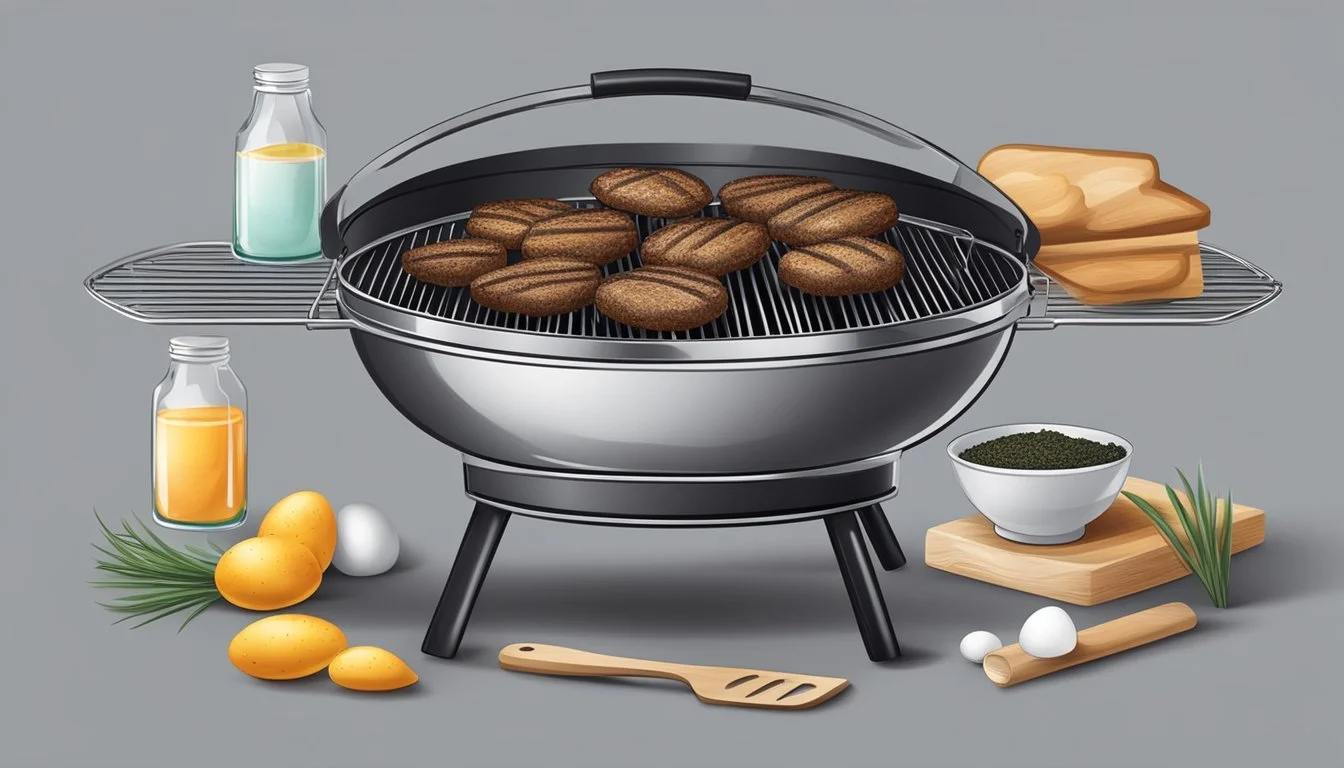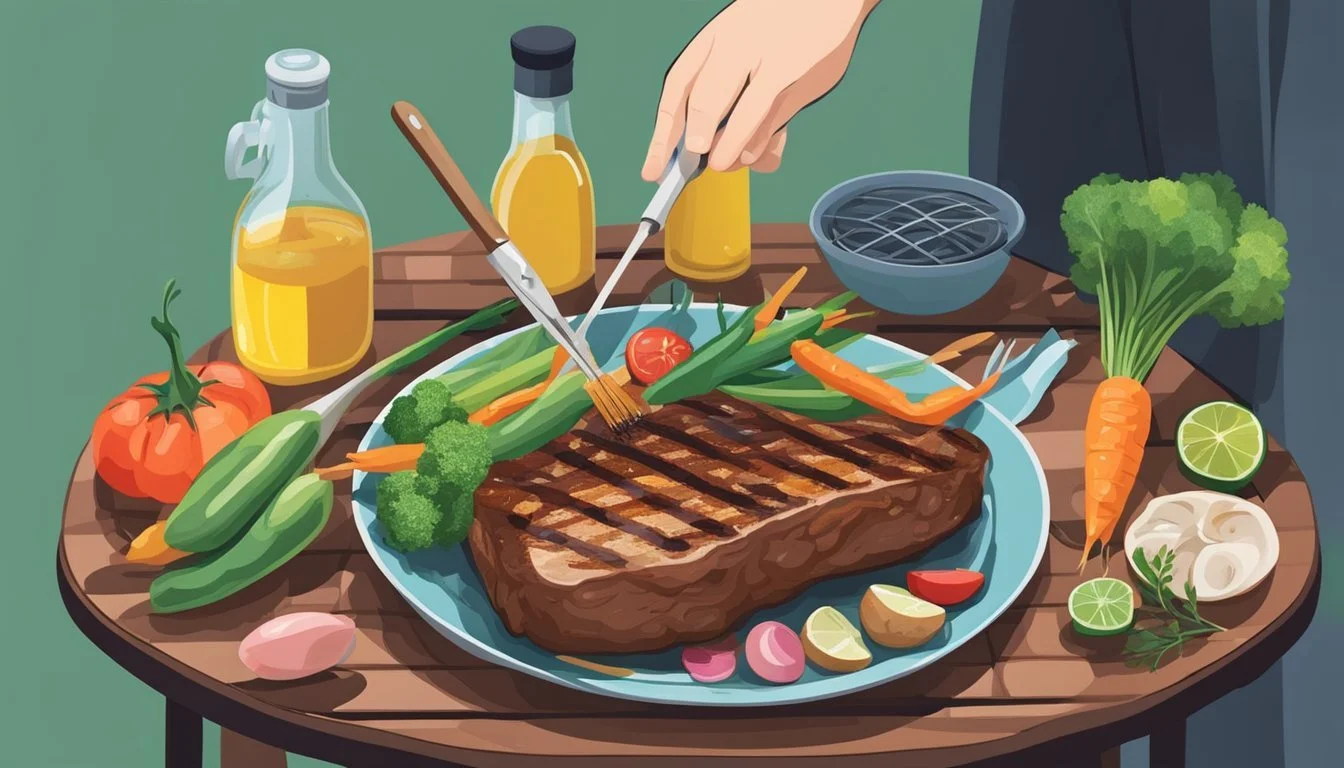Prepping Your Grill for the Easter Season
Essential Tips for a Feast to Remember
As spring gives way to the festive vibrancy of Easter, it's time to think about outdoor cooking and rejuvenating the grill for family gatherings and feasts. For many, the grill is an essential part of Easter celebrations, offering a chance to enjoy the warming weather and cook up a storm of seasonal flavors. Preparing the grill for Easter not only ensures safety and efficiency but also enhances the flavor and enjoyment of the food.
From checking the grill's components to cleaning and seasoning the grates, each step is crucial for optimal performance. A well-maintained grill can be the centerpiece of an Easter gathering, reflecting the care and attention to detail that elevates a meal from good to great. Properly prepping the grill involves a thorough inspection for any wear and potential hazards, followed by a deep clean to get rid of old residues, ensuring the stage is set for a delightful grilling season.
Before the guests arrive and the Easter festivities commence, taking the time to prep the grill can make all the difference. It's not just about safety and maintenance; it's also about priming the grill so that it delivers perfectly cooked meals (how long do cooked meals last?). Lighting up the grill for a test run can signal readiness and anticipation for the upcoming season of outdoor dining and enjoyment. Such preparation sets the stage for a successful Easter season filled with delicious, grilled dishes (What wine goes well with grilled dishes?) that can be shared with family and friends.
Safety First: Grill Inspection
Before the Easter season festivities begin, ensuring your grill is safe and ready is paramount. Pay special attention to gas leaks, the condition of hoses, and clearing potential fire hazards as part of a comprehensive safety inspection.
Checking for Gas Leaks
One of the critical areas to inspect on a gas grill are the connections for potential gas leaks. To test for leaks, apply soapy water to the connections and turn on the gas. Bubbles will form if there is a leak. Always perform this test in a well-ventilated area.
Examining Grill Hoses
Inspect the hoses for signs of cracking, wear, or brittleness. Look carefully along the entire length of each hose, feeling for any irregularities or abrasions. Replace any hose showing signs of damage to prevent gas leaks.
Reviewing The Owner’s Manual
Consult the owner’s manual for specific safety instructions and maintenance guidelines. It will provide the correct procedures for inspection and help identify parts that require regular checkups to maintain a safe operation.
Clearing Out Insects and Potential Fire Hazards
Insects can create nests that pose fire hazards. Check the burners and other grill areas for unwanted guests. Remove any debris, grease accumulation, or cobwebs. Ensure the grease tray is clean to prevent unwanted flare-ups or potential fires.
Cleaning Your Grill Thoroughly
In preparation for the Easter season, a thorough cleaning of one's grill is essential to ensure safe operation and optimal cooking performance. Dirt, grime, and leftover ash can impact flavor and function, making deep cleaning a crucial step.
Removing Ash and Residue
Before delving into deep cleaning, one should start by removing old ash and food particles. For charcoal grills, this involves discarding leftover ash—using a shop vac can expedite this process. In gas grills, a thorough inspection to remove debris and grease build-up in the cook box is needed. All residue should be removed to prevent flavor contamination and to promote better heat distribution.
Deep Cleaning Grill Grates
Grill grates require special attention. Stainless steel grates benefit from a preheat process, heating the grill to a high temperature for 10-15 minutes to loosen debris. After preheating, they must be scrubbed with a stainless steel wire brush. For cast iron grates, a deep clean involves heating followed by scrubbing with a grill brush. It’s advisable to oil cast iron grates post-cleaning to maintain seasoning and to prevent rusting. A non-toxic grill cleaner can assist in removing stubborn grime, ensuring the grates are thoroughly sanitized.
Method:
Preheat grill to loosen debris.
Turn off grill and let grates cool until they are warm to the touch.
Scrub using appropriate brushes.
If necessary, soak in a solution of warm water and a gentle detergent before another scrub.
Rinse and dry meticulously.
Dealing with Rust and Corrosion
To deal with rust and corrosion, one should inspect each component of the grill. Small rust spots on stainless steel surfaces can often be treated with a dedicated rust remover or a mixture of baking soda and water, applied with a soft cloth. For grates exhibiting significant rust, it may be time to consider replacement, especially if the structural integrity is compromised. Regular maintenance that includes wiping down surfaces and covering the grill with a grill cover when not in use will prevent most rusting issues from occurring in the first place.
Prepping for Optimal Performance
To ensure a grill performs reliably and delivers evenly-cooked food, a thorough prep routine focusing on the burners, grates, and a test run is vital. Proper maintenance doesn't just prolong the life of the grill; it also enhances the grilling experience.
Ensuring Burners and Valves Are Unclogged
Over time, grill burners and valves can become clogged with grease and debris, affecting the flow of gas and the heat distribution. This can be remedied by:
Inspecting burners for obstructions and using a thin wire or brush to clear any blockages within the ports.
Checking valves and hoses, ensuring they are in good condition. A simple way to test for leaks is to apply soapy water to the hoses; bubbles will form if there is a gas leak.
Testing and Seasoning Your Grates
When the grill grates are clean and well-seasoned, they create a pristine, non-stick surface for cooking. To achieve this:
Clean the grates thoroughly with a wire brush to remove old food particles.
Apply a thin coat of high-heat cooking oil to the grates using a paper towel or brush.
Preheat the grill on high heat for about 15-20 minutes. This process burns off residue and bakes the oil into the cast iron, seasoning the grates.
Conducting a Test Run
Before any big grilling event, a test run will confirm everything is working correctly.
Preheat the grill on high for 15 minutes to ensure consistent performance.
Observe the flame; it should be blue with yellow tips. If the flames are mainly yellow, the burners may require additional cleaning or adjustment.
Refilling or Replacing Essential Items
When preparing for the Easter grilling season, it is crucial to address the need for refilling or replacing key items such as the propane tank and the grease tray, along with ensuring that grilling tools and equipment are up to par for optimal performance.
Propane Tank and Grease Tray Maintenance
Propane Tank:
Ensure the propane tank is full; refill it if necessary.
Check for leaks by applying a soapy water solution with a spray bottle to the tank's valve, hose, and regulator; bubbles indicate a leak.
Grease Tray:
Replace aluminum foil lining the grease trap for easy clean-up.
Dispose of old oils and residue; clean thoroughly to prevent fires.
Upgrading Grilling Tools and Equipment
Grilling Tools:
Inspect tools for wear; upgrade to new, sturdy options if they show signs of damage.
Consider tools made with high-quality materials like stainless steel for longevity.
Equipment:
Examine grill grates and burners for deterioration, replacing parts when necessary.
Use canola oil to season new grill grates, enhancing their non-stick properties.
Adding the Finishing Touches
Before the main event of grilling begins, ensuring that the grill is ready to perform flawlessly is crucial. Properly preparing the grill surface and inspecting accessories not only enhances the experience but also affects the quality of the food.
Applying a Layer of Oil for a Non-stick Surface
To prevent food from sticking, one should coat the grill grates with a high smoke point oil, such as canola, peanut, or vegetable oil. Olive oil can also be used provided it’s the refined type, which has a higher smoke point than extra virgin olive oil. Here is how to apply the oil:
Preheat the grill to a medium-high temperature.
Dip a folded paper towel in oil and, using tongs, rub it over the grill grates.
Allow the grill to sit for a few minutes before placing any food on the grates.
Inspecting Grilling Accessories
Before starting, they should inspect their grilling tools to ensure they are clean and free from any damage that could affect their use. Here's a quick checklist:
Grill Brush: Check the bristles for wear and ensure none are loose to prevent them from transferring to the food.
Tongs and Spatulas: Ensure they are clean and have no rust or damage.
Basting Brush: Make sure the brush is clean and that the bristles or silicone tips are intact.
Food Safety and Preparation
Easter season brings families together over grilled feasts, making food safety and proper preparation paramount. Adhering to recommended cooking temperatures and cleanliness protocols ensures a safe, enjoyable experience for all.
Thoroughly Cleaning Cooking Surfaces
Before lighting up the grill, it's crucial to clean the grates to remove any residue from previous cooking. A dedicated grill brush should be used for scrubbing, followed by wiping down with a damp sponge. For an eco-friendly option, a halved onion dipped in olive oil can also clean and season the grates, adding an extra layer of flavor.
Selecting and Prepping Proteins and Vegetables
When it comes to grilling proteins like steak, chicken, lamb, and burgers, ensure they are fresh and of good quality. Pat them dry before cooking for better sear and flavors. Vegetables such as potatoes and onion should be washed and cut into even sizes for consistent cooking. Seafood should be fresh and properly cleaned.
Knowing Your Marinades and Spices
Marinades not only enhance flavor but can also improve food safety by reducing bacteria growth. Prepare your marinade using fresh herbs and spices, and allow meat to absorb the flavors for several hours, or preferably overnight, in the refrigerator. Always discard any leftover marinade that has come into contact with raw meat.
Avoiding Cross-contamination
Prevent bacteria transfer by using separate cutting boards and utensils for raw and cooked foods. Highlight the importance of clean practices by boldly marking these items. Wash hands thoroughly before and after handling any food to protect your family against stomach ailments caused by bacteria.
By following these guidelines, everyone can ensure a delicious and safe grilling experience for the Easter holiday.
Grilling Season Tips and Inspiration
With Easter approaching, the revival of grilling season brings a plethora of opportunities to innovate and entertain with tantalizing flavors. This section will guide you through new recipes, diverse menus, and advanced grilling techniques that will elevate your outdoor cooking.
Exploring New Grilling Recipes
As grill season kicks off, one should consider experimenting with new recipes. Incorporating rubs and marinades can transform the taste profiles of classic proteins like steaks, pork chops, (What wine goes well with pork chops?) and seafood. A popular choice for Easter is a succulent grilled lamb, which can be enhanced with rosemary or a rich apricot-Dijon glaze, providing a balance of earthy and sweet flavors.
Grilled Ham with Apricot-Dijon Glaze: Brush the glaze onto the ham during the last 30 minutes of grilling.
Rosemary Crusted Rack of Lamb: Apply a rub of minced rosemary, garlic, salt, and pepper prior to grilling.
Creating a Diverse Menu
To satisfy various palates, curate a menu that features a mix of meats, seafood, and burgers. But also consider guests who might prefer vegetarian options. For example, Grilled Artichokes (What wine goes well with grilled artichokes?) can be a unique, savory side dish to a traditional Easter spread.
Meat Selection:
Burgers: Mix ground meats or explore veggie varieties for diversity.
Seafood: Offer grilled shrimp or fish as lighter fare.
Vegetarian Suggestions:
Grilled Artichokes: Marinate in olive oil and herbs, then char slightly for taste.
Innovating with Grilling Techniques
Adopting new grilling techniques not only refines one's skills but also elevates the dining experience. Try using a smoking method for the Honey Glazed Smoked Ham to infuse smoky and sweet notes. Understanding the importance of food safety during outdoor cooking is paramount—always ensure proper temperatures are reached to prevent any food-related illnesses.
Smoking: Slow cook the ham with applewood chips for a subtle, smoky flavor.
Direct vs Indirect Heat: Use direct heat for quick-cooking items like burgers, and indirect heat for larger cuts requiring longer cooking times.
Remember, grilling season is an opportunity to showcase your creativity and skill with a grill, while ensuring the safe handling of food. With the right preparation and a spirit of culinary adventure, you can craft an unforgettable Easter meal that celebrates the joys of grilling.







